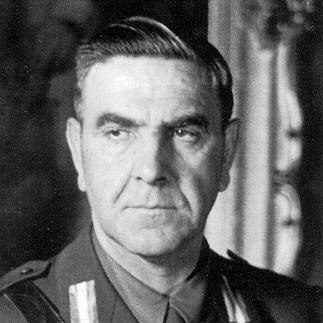By: Phil Kohn. Dedicated to the memory of his father, GM3 Walter Kohn, U.S. Navy Armed Guard, USNR, and all men and women who have answered the country’s call in time of need. Phil can be contacted at ww2remembered@yahoo.com.

In 1941, Croatian leader Ante Pavelić was named head of the new Independent State of Croatia, an Axis puppet. He served until May 8, 1945. Wikipedia.
In North Africa on April 11, 1941, Tobruk, Libya, is isolated, with the remainder of Allied troops withdrawing eastward into Egypt. Australian infantry and British artillery in the beleaguered city prevent Rommel’s troops from breaking through. In Yugoslavia, German forces are unstoppable, joined by Italian troops moving down the Dalmatian coast and Hungarian forces crossing the border and heading for Novi Sad. The Hungarians receive more resistance from Yugoslav civilians who are fighting them than they receive from the Royal Yugoslav Army. British, Greek, Australian and New Zealand forces engage the Germans in Greece for the first time, close to the northwestern border. In Washington, President Roosevelt creates the Office of Price Administration (known as the OPA), charged with the responsibility of controlling prices and profits and balancing civilian and defense needs.
Allied troops in Greece defending against the German advance begin to pull back from the Yugoslavian frontier towards Mt. Olympus on April 12. In Yugoslavia, Belgrade surrenders to Field Marshal Kleist’s force, which has advanced from Niš.
On Easter Sunday, April 13, in Moscow, the U.S.S.R. and Japan sign a five-year neutrality agreement. This diplomatic coup, which states that each country will remain neutral if the other is attacked by a third party, allows Stalin to begin moving troops westward from Siberia to face a possible German attack. In Libya, Axis attacks on Tobruk are repulsed. From the Vatican, Pope Piux XII broadcasts an appeal for listeners to pray for peace and calls for an end to attacks on civilian targets.
Yugoslavia’s King Peter departs the country and flies to Athens on April 14, followed the next day by numerous government officials. In Greece, Allied forces defending positions around Mt. Olympus are attacked by advancing Germans. The defenders pull back to shorter lines around Thermopylae. In secret talks with U.S. government representatives in New York, Icelandic officials agree that they will not resist an occupation of their island nation by U.S. troops. The Americans would replace British occupation forces currently there that could be used elsewhere.
On April 15, a German-Italian reconnaissance team reaches Halfaya Pass on the Libyan-Egyptian border. The Luftwaffe conducts an air attack on military and industrial targets in Belfast, Northern Ireland. Two hundred bombers drop high-explosive devices, killing 900 and injuring another 1,500 people.
The Royal Yugoslav Army capitulates to the Germans on April 16. In Croatia, Ustaše leader Ante Pavelić is named as head of the new Independent State of Croatia, an Axis puppet. During the course of the war, members of the Ustaše (a fascist, ultranationalist movement and organization) will murder some 500,000 Serbs, Jews and Roma (gypsies). In Cairo, British Middle East Commander Gen. Archibald Wavell — weighing the Allied situation in North Africa and in Greece — halts the transfer of Australian and Polish troops from Egypt to Greece, effectively abandoning the Greek campaign. In the Mediterranean, a convoy of four German troopships and one Italian ammunition ship, escorted by three Italian destroyers, is intercepted by four British destroyers near the Kerkennah Islands, off the coast of Tunisia. In the ensuing battle, the British lose one destroyer, but all five convoy vessels are sunk. Only about 1,250 of the 3,000 German troops aboard are rescued. Overnight, 700 Luftwaffe aircraft bomb London heavily.
In Yugoslavia, Italian troops on April 17 enter Dubrovnik, on the Dalmatian coast. In Belgrade, former prime minister Dušan Cvetković (deposed on March 27) signs an armistice with the Germans. In overrunning the country, the Germans have suffered fewer than 200 dead. In Libya, another German-Italian attack against Tobruk is held off.







